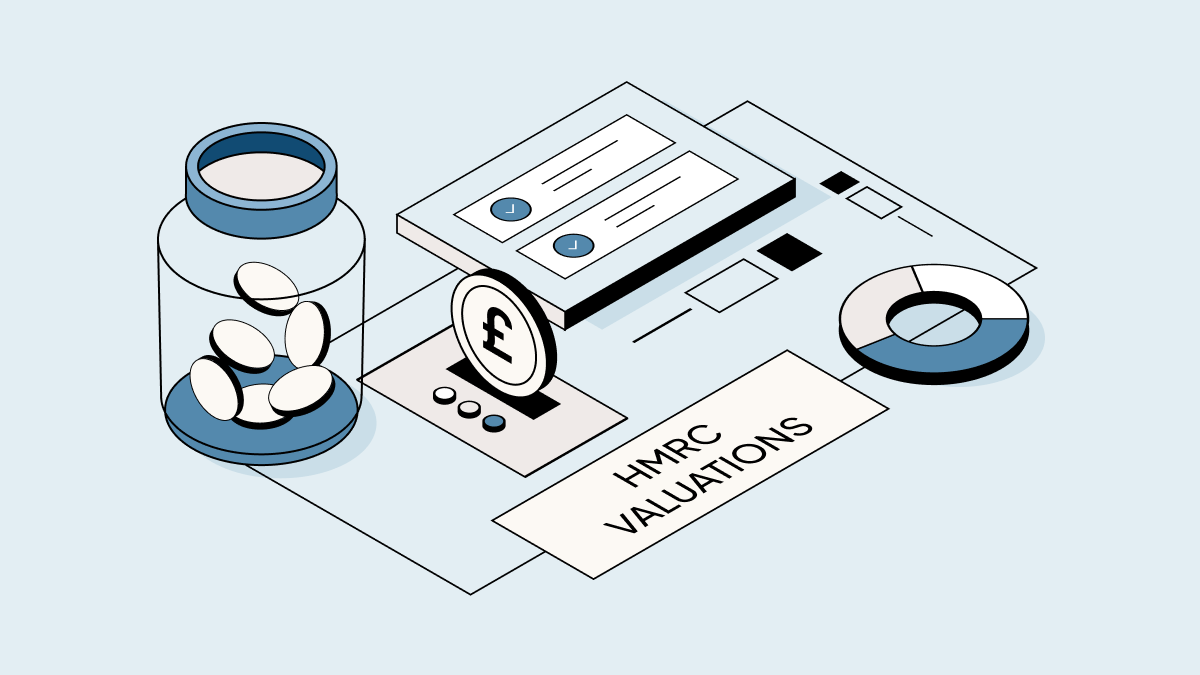Just as your company offers employee equity in order to recruit talented people, the British Government offers schemes such as EMI and CSOP to attract talented businesses to the UK. To get the most out of an EMI or CSOP scheme, and reap its tax benefits for your company and employees, you’ll need an HMRC valuation.
But what exactly is an HMRC valuation? In this article, we’ll explain the ins and outs of valuations, from the benefits of pre-clearance to the timeframes for approval from HMRC.For a thorough breakdown of HMRC valuations, read through from start to finish. If you know what you’re looking for, jump ahead to a particular section.
What’s an HMRC valuation?
An HMRC valuation is the umbrella term for a company valuation approved by HMRC, for the purpose of issuing option grants under an EMI, CSOP or SIP scheme in the UK. The valuation determines the share price at which your company issues options to its employees.
Do I need an HMRC valuation?
HMRC valuations are not mandatory, technically speaking. You can set up an EMI scheme and issue employees equity without an HMRC-approved valuation, but it’s not advised. Ideally, you should obtain a company valuation at the point of setting up your employee share ownership plan (ESOP), before you begin issuing option grants.
When do I need an HMRC valuation?
In order to issue option grants, you need to determine the company valuation and the price per share.If you’re planning to issue option grants to your employees – as opposed to awarding company shares outright – you should set up an ESOP. There are a number of schemes in the UK, such as EMI and CSOP, that offer tax advantages to companies and employees who participate.
What’s the difference between EMI & CSOP?
From the perspective of a company valuation, there’s no difference between EMI and CSOP. The valuation is performed in the same way and approved by HMRC in the same way. However, the schemes differ in terms of how they operate and who qualifies.
Enterprise Management Incentive – EMI
HMRC introduced the EMI scheme to encourage companies to grant share options to their employees. The scheme offers significant tax advantages to both companies and the employees awarded share options.Under EMI, companies can award options worth up to £250,000 to eligible employees who. To qualify, an employee must be employed full-time with the business.There are limits to the scheme, however, as businesses must have gross assets under £30 million and employ fewer than 250 people full-time. Specific industries are also disqualified from EMI, including banking, insurance, legal services and accountancies.
Company Share Option Plan – CSOP
For companies that don’t meet the criteria for EMI, there’s CSOP, another HMRC-sponsored scheme. The tax treatment is broadly similar to EMI, but the award limits are much lower.However, from April 2023, the upper-value limit on CSOP will increase from £30,000 to £60,000 per person – an important development that will effectively double the scheme’s strength as an employee incentive.
What is HMRC pre-clearance?
Pre-clearance is the term used by HMRC for approval of your company valuation. You don’t need to secure pre-clearance from HMRC to issue option grants to your employees, but doing so has its benefits.For your employees: pre-clearance ensures your employees aren’t subject to high tax rates in the future. EMI options, for example, are taxed at just 10% CGT upon exercising.For your company: similar tax issues are avoided by pre-clearance, as are additional national insurance contributions. If you run into either issue during an M&A acquisition, it could cause serious problems for the business.
When does an HMRC valuation expire?
Once approved by HMRC, your company valuation is valid for 90 days or until a significant event occurs. Significant events include:
-
A change in the share or loan capital of the company
-
An arm’s length transaction involving shares of the company
-
Negotiations or preparations for an IPO or acquisition
-
A declaration of a dividend on any class of shares in the company
-
Publishing new financial information such as annual accounts
Once it expires, you must apply for a new one using updated company information.Because HMRC valuations have such a short lifespan, significant events will most likely be reflected in the normal course of your option granting cycle. You can also discuss any anticipated material changes with HMRC. As a result, you’re unlikely to need a valuation more often than every 90 days.
What do I need for an HMRC valuation?
A range of financial information is used to determine your company valuation, whether you’re performing it in-house or through a provider such as Carta. We ask customers to provide the following inputs:
Company details
-
Articles of association
Financial information
-
Historical income statements and balance sheet
-
Financial forecasts
Qualitative information
-
Company overview
-
Updates since the last valuation
-
Previous valuation reports
How long does an HMRC valuation take?
Once you’ve supplied the company information needed, Carta can perform an EMI or CSOP valuation in three to five business days. We’ll then deliver the initial report for your review, and you’ll have the chance to raise queries or seek clarification from our in-house valuations analysts.After you've approved the report, we’ll file it with HMRC on your behalf, along with a VAL231 filing for EMI schemes. HMRC typically takes 30 days to review and approve a company valuation.With Carta, the journey from requesting a valuation to receiving approval from HMRC should take no longer than six weeks.
EMI & CSOP valuations with Carta
Let Carta solve the pain of EMI and CSOP valuations for you, with our cost-effective Grow and Scale packages that include unlimited valuations on demand. Our expert analysts work with your data to deliver valuations quickly and accurately. We’ll even liaise with HMRC for you, and handle any negotiations with them so you don’t have to.



